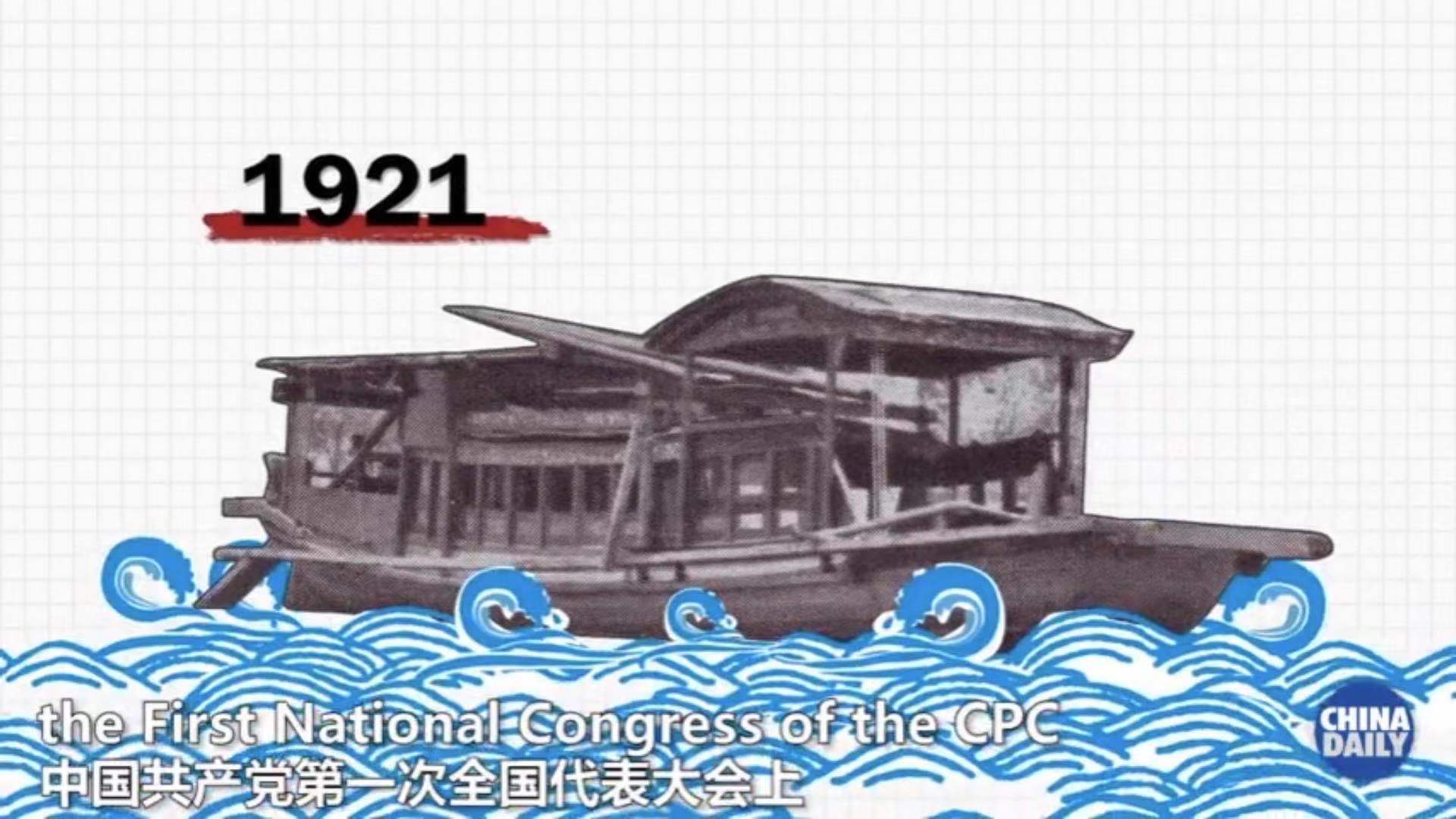
A sign marking the 100th anniversary of the founding of the CPC is seen in Shanghai,
How did the Communist Party of China (CPC) grow from an organization of just over 50 members to the world's biggest political party with more than 91 million members during the past 100 years? What are the reasons behind its creation, development and success? A recently released short video by China Daily explored the answers.
The five-minute video, released days ahead of the CPC's centenary, reviewed China's struggles for independence, development and modernization amid a series of crises in the 19th and early 20th centuries and the CPC's role in the process.
Since China's defeat in the Opium War in the 1840s, generations of Chinese patriots made a number of attempts to transform the country. "They tried to push for reform and build a constitutional monarchy, but it failed. They were able to build a democratic republic through revolution (the Xinhai Revolution in 1911), but it did not last long," the video noted.
"The Chinese people were very motivated," said Jin Canrong, a professor of international relations at Renmin University of China. "When facing the external pressure, they made many attempts, but most of them failed."
"In the end the people chose the strong leadership of the Communist Party of China because they have a goal of modernizing China," Jin added.

A screenshot of the China Daily video
Early Communist groups started to sprout up in Chinese cities with a large working class during the May Fourth Movement in 1919, when students and workers protested the government that caved in to demands by imperialist powers after World War I. During the protests, intellectuals influenced by Marxism after the October Revolution in Russia in 1917 were touched by the power of workers in the fight to save China.
The CPC was founded in July 1921 amid Chinese Communists' efforts to find a way out for the country.
"From the day of its foundation the CPC was determined to reach out to the lower strata of society, to the toiling masses who made up the vast majority of the Chinese population and to mobilize them," said Zhou Kun, a researcher at the Institute of Party History and Literature of the CPC Central Committee.
Led by Mao Zedong, the CPC worked to mobilize peasants – the silent majority of the Chinese people at that time, paving the way for its unique revolutionary strategy of surrounding cities from the countryside and eventually established the People's Republic of China in 1949.

A screenshot of the China Daily video
"The only thing that draws people together is by addressing majority people's concern," said Fred Engst, son of Sid Engst and Joan Hinton, an American couple who came to China in the 1940s and witnessed China's revolution and socialist development.
"When you sided with the overwhelming majority of the people, the peasantry, the workers, people in lower, you will get their support," he said.
"The path of socialism chosen by China is a choice made by history and by the people," the video said in the end, quoting the words of Chinese President Xi Jinping, who is also general secretary of the CPC Central Committee.
‘Socialism with Chinese characteristics’ explained
Socialism with Chinese Characteristics
crienglish.com
Socialism with Chinese characteristics is something that combines the basic principles of scientific socialism with the facts of building socialism unique to China. Socialism is the common rule and essential feature of the practice, while Chinese characteristics are what the basic principles of socialism really embody in China.
Since China began its economic reform and opening-up in 1978, the Communist Party of China has been continuing to adapt the basic principles of Marxism to the actual conditions of China. By summarizing the successes and failures of building socialism in China and other socialist countries, by drawing lessons from the benefits and losses of developing nations in their developments, and also by analyzing what situations and contradictions developed countries faced in their developments, the Communist Party of China has systematically answered a series of key questions in terms of China's own path of socialism, its historical periods, its fundamental tasks and strategic steps it should take. Based on all these efforts, the Communist Party of China has successfully opened up a unique path for socialism with Chinese characteristics.
On its economic fronts, China sticks to a multi-ownership-oriented basic market economic system, with the public ownership in the dominance.
On its political fronts, China upholds a system of the People's Congress, a system of multiparty cooperation and political consultation, and a system of regional ethnic autonomy.
And in its cultural fields, China keeps its socialist value system at the core of social trends, while respecting differences and expanding common grounds.
These practices have proved that socialism with Chinese characteristics is the only and successful road China must take in building it into a well-off, democratic, civilized and harmonious modern nation.
No comments:
Post a Comment